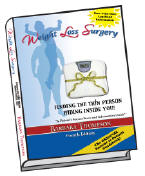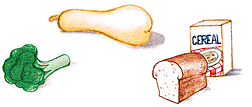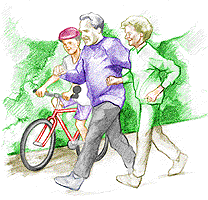|
Subscribe
to our
FREE Monthly
e-Newsletter |
|
Click Here |

Have You Ordered Your Book Yet?
Click Here
|
 |
|
|
Constipation (con-stuh-PAY-shun) means that a person has three
bowel movements or fewer in a week. The stool is hard and dry.
Sometimes it is painful to pass. You may feel "draggy"
and full.
Some people think they should have a bowel movement every day.
That is not really true. There is no "right" number of
bowel movements. Each person's body finds its own normal number of
bowel movements. It depends on the food you eat, how much you
exercise, and other things.
At one time or another almost everyone gets constipated (CON-stuh-pay-ted).
In most cases, it lasts for a short time and is not serious. When
you understand what causes constipation, you can take steps to
prevent it.
|
|
Changing what you eat and drink and how much you exercise will
help relieve and prevent constipation. Here are some steps you can
take.

1. Eat more fiber.
Fiber helps form soft, bulky stool. It is found in many
vegetables, fruits, and grains. Be sure to add fiber a little at a
time, so your body gets used to it slowly. Limit foods that have
little or no fiber such as ice cream, cheese, meat, snacks like
chips and pizza, and processed foods such as instant mashed
potatoes or already-prepared frozen dinners. The following chart
shows you some high-fiber foods.High-Fiber Foods
| Fruit |
Vegetables |
Breads, Cereals, and Beans |
Apples
Peaches
Raspberries
Tangerines |
Acorn squash
Broccoli, raw
Brussels sprouts
Cabbage
Carrots, raw
Cauliflower, raw
Spinach
Zucchini |
Black-eyed peas
Kidney beans
Lima beans
Whole-grain cereal, cold (All-Bran, Total, Bran Flakes)
Whole-grain cereal, hot (oatmeal, Wheatena)
Whole-wheat or
7-grain bread |

2. Drink plenty of water and other liquids such as fruit and
vegetable juices and clear soup.

Liquid helps keep the stool soft and easy to pass, so it's
important to drink enough fluids. Try not to drink liquids with
caffeine or alcohol in them. Caffeine and alcohol tend to dry out
your system.3. Get enough exercise.
Doctors are not sure why, but regular exercise helps your system
stay active and healthy. You don't need to become a great athlete.
A 20- to 30-minute walk every day will do the trick.

4. Allow yourself enough time to have a bowel movement.
Sometimes we feel so hurried that we don't pay attention to our
bodies' needs. Make sure you don't ignore the urge to have a bowel
movement.5. Use laxatives only if a doctor says you should.
Laxatives (LAHK-sa-tivz) are medicines that will make you pass a
stool. Most people who are mildly constipated do not need
laxatives. However, if you are doing all the right things and you
are still constipated, your doctor may recommend laxatives for a
limited time.
Your doctor will tell you if you need a laxative and what type is
best. Laxatives come in many forms: liquid, chewing gum, pills,
and powder that you mix with water, for example.6. Check with your doctor about medicines you may be taking.
Some medicines may cause constipation. They include calcium pills,
pain pills with codeine in them, some antacids, iron pills,
diuretics (water pills), and medicines for depression. If you take
medicine for another problem, be sure to ask your doctor about it.
|
|
|
- Constipation affects almost everyone at one time or another.
- Many people think they are constipated when really they are
not.
- In most cases, following these simple tips will help:
- Eat a variety of foods. Eat a lot of beans, bran, whole
grains, fresh fruits, and vegetables.
- Drink plenty of liquids.
- Exercise regularly.
- Do not ignore the urge to have a bowel movement.
- Understand that normal bowel habits are different for
everyone.
- If your bowel habits change, check with your doctor.
- Most people with mild constipation do not need laxatives.
However, doctors may recommend laxatives for a limited time
for people with chronic constipation.
- Medicines you may be taking for another problem can cause
constipation.
|
|